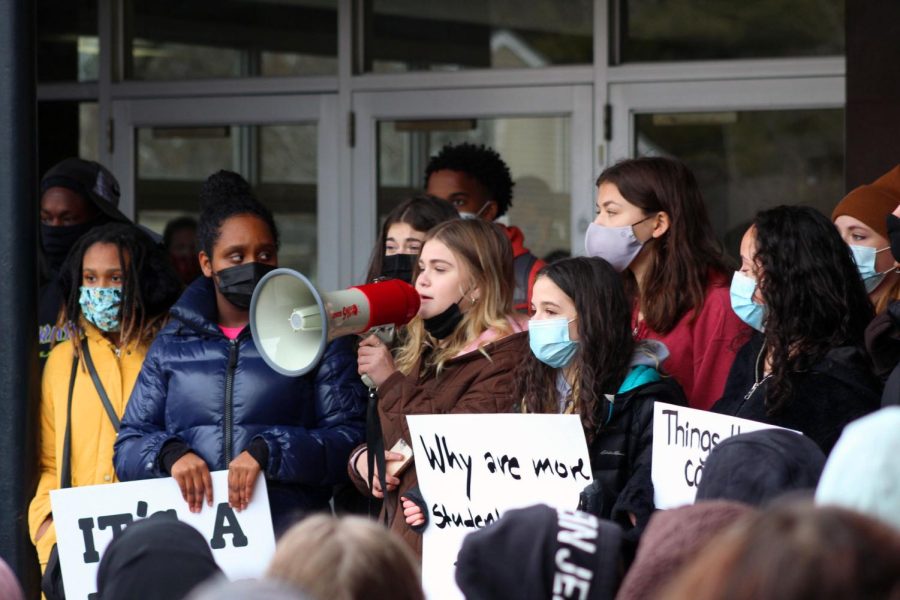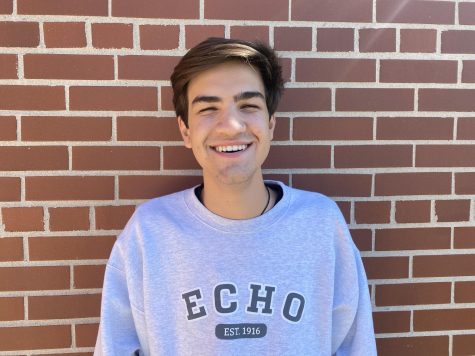Walkout calls attention to sexual assault culture
Event holds honest discussion with purpose of sparking change
November 21, 2021
Although she was surprised by how fast the walkout came together, senior Gracia Rettig said the unrest at Park reminded her of the need for a safer community.
“It got planned really quickly, but I think that everything going on at our school really inspired us to get it started fast,” Rettig said.
Rettig was one of the organizers at the walkout against sexual violence that occured Nov. 18. The event also included an open discussion for students to share their experiences, advocate for accountability and teach about consent. Organizers hoped the walkout would facilitate important conversations about sexual assault.
When sophomore Willis Gohman heard about the walkout, he said he made it a priority to attend. According to Gohman, attending could set an example for his peers to support victims of sexual assault.
“I thought (that), if that’s happening, that’s something that I should be at,’” Gohman said. “If I’m not, it’s putting out a message to all my friends that it’s okay to be okay with sexual assault, and that’s just not right.”
Feeling grateful to see the unifying spirit behind the walkout, senior and GU social media coordinator Anna McCarthy said the event brought people together in ways she hadn’t expected.
“It was really amazing to see a community of girls who came from all different friend groups, all corners of the school, come together and join in on one big thing,” McCarthy said.
According to junior Sydney Schultz, attending a student-facilitated event with a large, supportive crowd sent a powerful message to the perpetrators of rape culture.
“I’m glad that it was organized by students and it was student-led,” Schultz said. “That’s really powerful.”
In wake of the unrest taking place at Park, senior Gracia Rettig said she felt responsible to start a dialogue among students.
“In the rise of everything happening at our school, we thought it was more important now than ever,” Rettig said. “It’s a constant conversation that we need to be having.”
Shocked to hear the stories being told, Gohman said he was alarmed to see how many of his friends are victims of sexual assault.
“These things happen a lot more than you actually think they would,” Gohman said. “A lot of these people that were speaking were people that I’m friends with and I had no idea that’s happened to them.”
At the beginning of the walkout, a rule was put in place that no perpetrators or victims of sexual assault would be called out by name. According to McCarthy, this rule was made in order to shine the spotlight on the survivors of sexual assault, not their abusers.
“We want (the victims’) voices to be heard and to keep it a safe space,” McCarthy said. “We felt as though if people were called out, it could turn into a hostile environment and could start a fight and we wanted to make it more about supporting victims.”
Rettig said social media was key in order to obtain the crowd size that was achieved at the walkout — had social media not been a factor, the turnout would be drastically different.
“It would have had to be word-of-mouth through our school and it wouldn’t have been the turnout that it was without social media,” Rettig said.
According to McCarthy, the club intends to hold similar events to keep the conversation active and not let the momentum surrounding the movement die.
“This wasn’t a one time thing,” McCarthy said. “It’s going to continue.”




